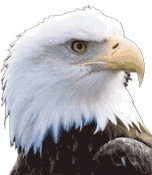 In 1782, US Congress selected thebald eagleas the emblem of the newly formed United States, because it symbolized courage and might, and because it wasindigenousonly to the United States and to Canada. In 1782, US Congress selected thebald eagleas the emblem of the newly formed United States, because it symbolized courage and might, and because it wasindigenousonly to the United States and to Canada.
The national seal depicts the bald eagle with its wings spread, with one claw clutching an olive branch, and the other claw grasping arrows. The eagle, however, strikes different poses on other national depictions.
The bald eagle owes its name to the early American colonists, and is bald in name only. As the white-headed American eagle differed from the European gray eagle, the colonists used their word for white, which translated into bald, in describing it. Unfortunately for the eagle, the literal translation, bald-headed, stuck like atoupee.
Since ancient times, men have identified themselves with the eagle, because it creates an impression of majesty and of power while in flight. As early as 5,000 years ago, ancient Sumerians chose the eagle, in spread eagle form, as their emblem symbolizing their power. Ancient Romansfollowed suit, as did Emperor Charlemagne, and finally Napoleon. No doubt, Congress considered the eagle's historicalpedigreeas being the animal representing a nation's power, when selecting it to be the national emblem of the United States.
|
|
note:
|
bald eagle: 秃头鹰
indigenous: 本土的
toupee: 假发
follow suit: 跟着做
pedigree: 血统
|
|